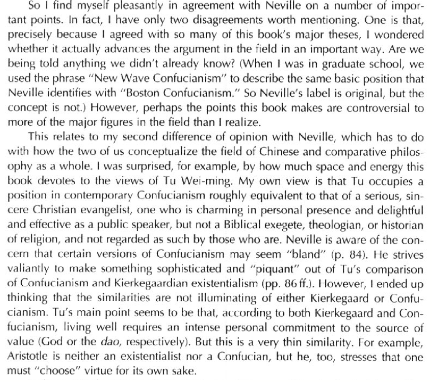I’m officially back in Fearless Leader mode. I’d like to thank Dan Robins very much for guest blogging. We’ll have Dan back in the future, I’m sure (not that he’s going away; I’m sure he’ll be very active in commenting). I’ll be starting some posts composed by my Phil. 245 (‘Confucianism’) students in the next few days. Meanwhile, I thought it would be fun to discuss “portable tradition,” a phrase Robert Neville uses to describe “Boston Confucianism.” The idea of Boston Confucianism was used initially tongue-in-cheek by Neville to refer to the New Confucian movement, in which he included Tu Wei-ming and himself, both of whom teach in Boston–one north of the Charles River (at Harvard) and one south (at BU).
The portability of Confucian tradition is based on the idea that there is nothing necessarily parochial, geographically speaking, about Confucianism–one need not be culturally Chinese or Sino-centered for the tradition to have some intellectual hold or appeal. You don’t have to be Greek, likewise, to be a Platonist. At this level of generality, it all sounds fine, if not innocuous. There is, however, the lingering question of portability not so much across geography (narrowly construed), but across time: is Confucianism portable into modernity and post-modernity?
At least one indirect criticism of portable Confucianism was provided by Bryan van Norden in his 2003 review (PEW 53:3) of Neville’s book, Boston Confucianism (Albany, NY: State University of New York Press, 2000). I’m going to cut and paste (an image of) van Norden’s most critical comments, because I think he’s actually on to something, despite seeming only to be snarky (sorry about png quality–I’m too lazy to type all this out):

I have to admit, when I read *non-exegetical* pieces by Tu, there is something bland about his discussions–actually, they tend to strike me alternatively as bland or pragmatically undecipherable (What am I supposed to do with the fact of the dependency of human relations on larger patterns of connections to the cosmos as a whole? Study astronomy? Then what?) Is there something striking or captivating about what either Neville or Tu promote in their versions of Confucianism? Admittedly, I haven’t read enough of their works to be an expert; so let me know.
(Did I mention I was fearless?)

